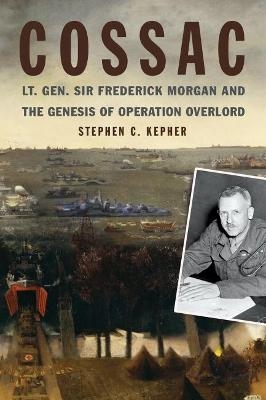
COSSAC
Lt. Gen. Sir Frederick Morgan and the Genesis of Operation OVERLORD
Seiten
2020
Naval Institute Press (Verlag)
978-1-68247-508-9 (ISBN)
Naval Institute Press (Verlag)
978-1-68247-508-9 (ISBN)
When Frederick Morgan was appointed COSSAC (Chief of Staff to the Supreme Allied Commander), in the spring of 1943, there was no approved plan for a cross-Channel attack and no commander. While often overlooked in the D-Day story, Morgan was one of the most important contributors to OVERLORD's success.
When Frederick Morgan was appointed COSSAC (Chief of Staff to the Supreme Allied Commander), in the spring of 1943, there was no approved plan for a cross-Channel attack and no commander. There was not even agreement about when the re-entry into the Continent would occur. The western Allies were in the midst of a great debate about the strategy or strategies to defeat Nazi Germany.
COSSAC's primary task was to create a plan that would be approved by the inter-allied Combined Chiefs of Staff. To gain that authorization, Morgan had to decide where the attack was to take place, address the need for improvised shelters for the transport ships until a port could be captured; create all the structure necessary for a multi-national force that would liberate countries, not occupy them; and convince his superiors that it could be done with the limited forces they were willing to provide.
COSSAC presents a new interpretation of Morgan's vital contributions to the development of the OVERLORD plan by exploring his leadership, his unorthodox approach to problem-solving, and his willingness to disregard or modify orders he thought wrong. By constantly taking the initiative to move the discussions forward, Morgan secured the needed political approval of a concept for the Normandy landings that Montgomery and Eisenhower would modify into the D-Day operational plan.
When Frederick Morgan was appointed COSSAC (Chief of Staff to the Supreme Allied Commander), in the spring of 1943, there was no approved plan for a cross-Channel attack and no commander. There was not even agreement about when the re-entry into the Continent would occur. The western Allies were in the midst of a great debate about the strategy or strategies to defeat Nazi Germany.
COSSAC's primary task was to create a plan that would be approved by the inter-allied Combined Chiefs of Staff. To gain that authorization, Morgan had to decide where the attack was to take place, address the need for improvised shelters for the transport ships until a port could be captured; create all the structure necessary for a multi-national force that would liberate countries, not occupy them; and convince his superiors that it could be done with the limited forces they were willing to provide.
COSSAC presents a new interpretation of Morgan's vital contributions to the development of the OVERLORD plan by exploring his leadership, his unorthodox approach to problem-solving, and his willingness to disregard or modify orders he thought wrong. By constantly taking the initiative to move the discussions forward, Morgan secured the needed political approval of a concept for the Normandy landings that Montgomery and Eisenhower would modify into the D-Day operational plan.
Stephen Kepher, a former U.S. Marine Corps officer and an independent scholar, received his MLitt (with distinction) in War Studies from the University of Glasgow and holds a BA in International Relations from the University of Southern California. He has presented papers on COSSAC at a Society for Military History's annual conference and at Normandy 75, at the University of Portsmouth, UK. He is a member of the Society for Military History and the Naval Institute.
| Erscheinungsdatum | 02.10.2020 |
|---|---|
| Reihe/Serie | Studies in Naval History and Sea Power |
| Zusatzinfo | 17 black & white illustrations, 4 maps |
| Verlagsort | Annopolis |
| Sprache | englisch |
| Maße | 154 x 231 mm |
| Gewicht | 675 g |
| Themenwelt | Sachbuch/Ratgeber ► Geschichte / Politik ► Allgemeines / Lexika |
| Geschichte ► Allgemeine Geschichte ► 1918 bis 1945 | |
| Geschichte ► Teilgebiete der Geschichte ► Militärgeschichte | |
| Sozialwissenschaften ► Politik / Verwaltung | |
| ISBN-10 | 1-68247-508-5 / 1682475085 |
| ISBN-13 | 978-1-68247-508-9 / 9781682475089 |
| Zustand | Neuware |
| Informationen gemäß Produktsicherheitsverordnung (GPSR) | |
| Haben Sie eine Frage zum Produkt? |
Mehr entdecken
aus dem Bereich
aus dem Bereich
ein Psychologe erlebt das Konzentrationslager
Buch | Hardcover (2024)
Kösel (Verlag)
CHF 30,80
Mythos „Stauffenberg-Attentat“ – wie der 20. Juli 1944 verklärt und …
Buch | Hardcover (2024)
Goldmann (Verlag)
CHF 33,55


